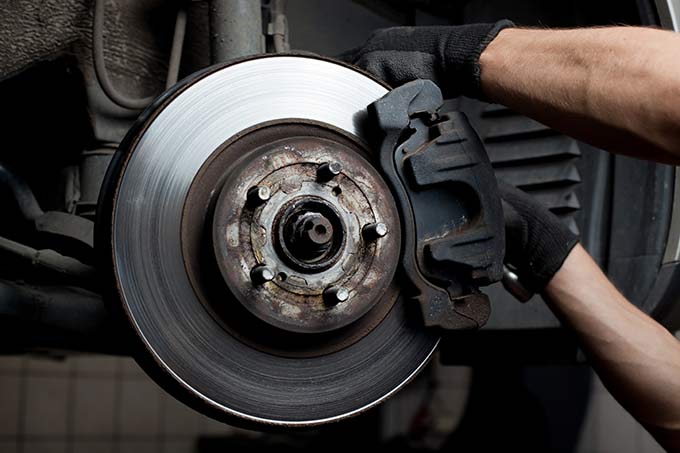The brakes on your car are vital automotive functions that few understand, but everyone expects to work. They are quite magical: With the simple push of a pedal, an incredibly heavy piece of moving machinery can come to a smooth and complete stop. However, like any part of a vehicle, brakes can wear out over time. If they give way, your vehicle can lose the ability to stop until a much stronger force slows it down - with terrible consequences.
August is Brake Safety Awareness Month - a great time to give your vehicle’s brakes some TLC and ensure that they are in good shape for the next year of trips. Instead of waiting for the tell-tale squeal of brake problems, taking the time to increase your knowledge of how brakes work and the necessary maintenance can save you time and money, as well as reduce the risk of injury to yourself or others.
In this article, we will look at the common signs of brake failure, and how to remedy many common issues with automotive brakes.
Understanding How Brakes Work
Before tackling brake issues and how to keep them working properly, it can be beneficial to understand a bit about how brakes work in vehicles. Contrary to popular belief, brakes are a relatively simple system made up of a couple of parts:
- Brake Disc or Rotor
- Brake Caliper
- Brake Pad
- Brake Lines
In essence, when you press the brake pedal in your vehicle, many parts of the braking system activate in short succession. Pressing the brake pedal transmits a force to the master cylinder that sends brake fluid through the lines to the caliper. The caliper responds to the forced fluid from the “press of the pedal” through the brake lines and tightens the caliper against the brake drum, slowing down the wheels until the vehicle comes to a complete stop.
Top 7 Signs Your Brakes Are Failing
While the brake system of your vehicle is relatively simple and made up of only a few parts, the brakes must operate successfully and quickly to ensure a complete stop - sometimes within milliseconds.
If your brakes are worn, if the brake lines are loose or failing, or if the entire system is coming apart, your brakes may not respond quickly or at all when you depress the brake pedal. The best way to keep your brakes working properly is to pay attention to several signs of brake failure and take the necessary steps to mediate any problems quickly.
1. Appearance Of A “Brake Light” On The Dashboard
In most modern vehicles, your dashboard system is equipped with a monitor to keep an eye on possible brake problems. Should a yellow or red indicator appear on your dashboard, it is time to get your brakes checked out by a professional mechanic.
2. A Squeal or Squeak When Slowing Down
We’ve all noticed a car that appears to be “screaming” as it comes to a stop at a stop sign or light. If you notice your vehicle emitting a squeak, squeal, or grinding sound when you slow down, it is time to get your brakes checked. Brakes are installed with “brake pad wear indicators,” which will emit a high pitched sound to alert you possible brake pad wear or issues.
3. The Vehicle Shakes When Slowing Down
Another tell-tale sign of brake failure is a vibrating or shaking of the vehicle as you come to a stop. This shaking is likely due to the wearing down of the brake rotor that has become disfigured or broken, causing an uneven slowing experience.
4. Leaking Brake Fluid
Not every fluid that falls from below your vehicle is condensation or oil. In some cases, brake fluid can leak from wear or tear on the master cylinder or brake line and lead to a lack of necessary fluid to depress the caliper when braking. If you notice a leak of any kind under your vehicle, you should immediately check with a professional to ensure you aren’t losing brake fluid.
5. Loose or “Down To The Ground” Brake Pedals
If you find yourself pushing your brake pedal to the floorboard to stop the vehicle, your vehicle may require brake repair. Most modern brake systems should respond quickly to any pressure put on the brake pedal and leave a good inch or two from the floorboard when depressed completely.
6. Rocky Starting & Stopping
If you notice your vehicle giving you a short “jump” sensations when starting or stopping, it is crucial to check your brake system. Often, this may be related to a separate issue (such as worn shock absorbers), but you never want to ignore an unusual issue related to your braking experience.
7. A Burning Smell
Finally, a quick and easy way to know that you need brake TLC is a noticeable smell of burning that occurs when slowing down or stopping. This burning may be coming from friction in the brake system due to worn brake pads or rotors. This burning can be an indicator that brake failure is on its way.
How To Care For Your Brakes
When you begin to notice any of the above problems or signs of brake failure, address the problem quickly to avoid a worse problem. Many car owners fear the unknown when it comes to their brakes, and will choose to ignore the problem rather than get help or take steps to remedy the issue.
A great place to start when you begin to notice anything unusual with your brakes — or any part of your vehicle for that matter — is to seek the professional help and guidance of a mechanic or specialist. A qualified technician can help you discover the problem at hand and the best way to fix the issue for good.
Finally, make sure to care for your brakes proactively by practicing good driving habits such as smoothly slowing down, avoiding sudden stops that can wear brake pads, and keeping your tires and wheels clean from dirt and grime.
Make August Your Yearly Brake Check Month
By taking the simple steps to ensure that your brakes are in good shape, you can drive with confidence and ensure that your vehicle stays on the road longer. As August is Brake Safety Awareness Month, practice responsible car ownership by making August the month that you give extra time and care to your brakes each year. Your vehicle, your wallet, and your fellow drivers will thank you.









